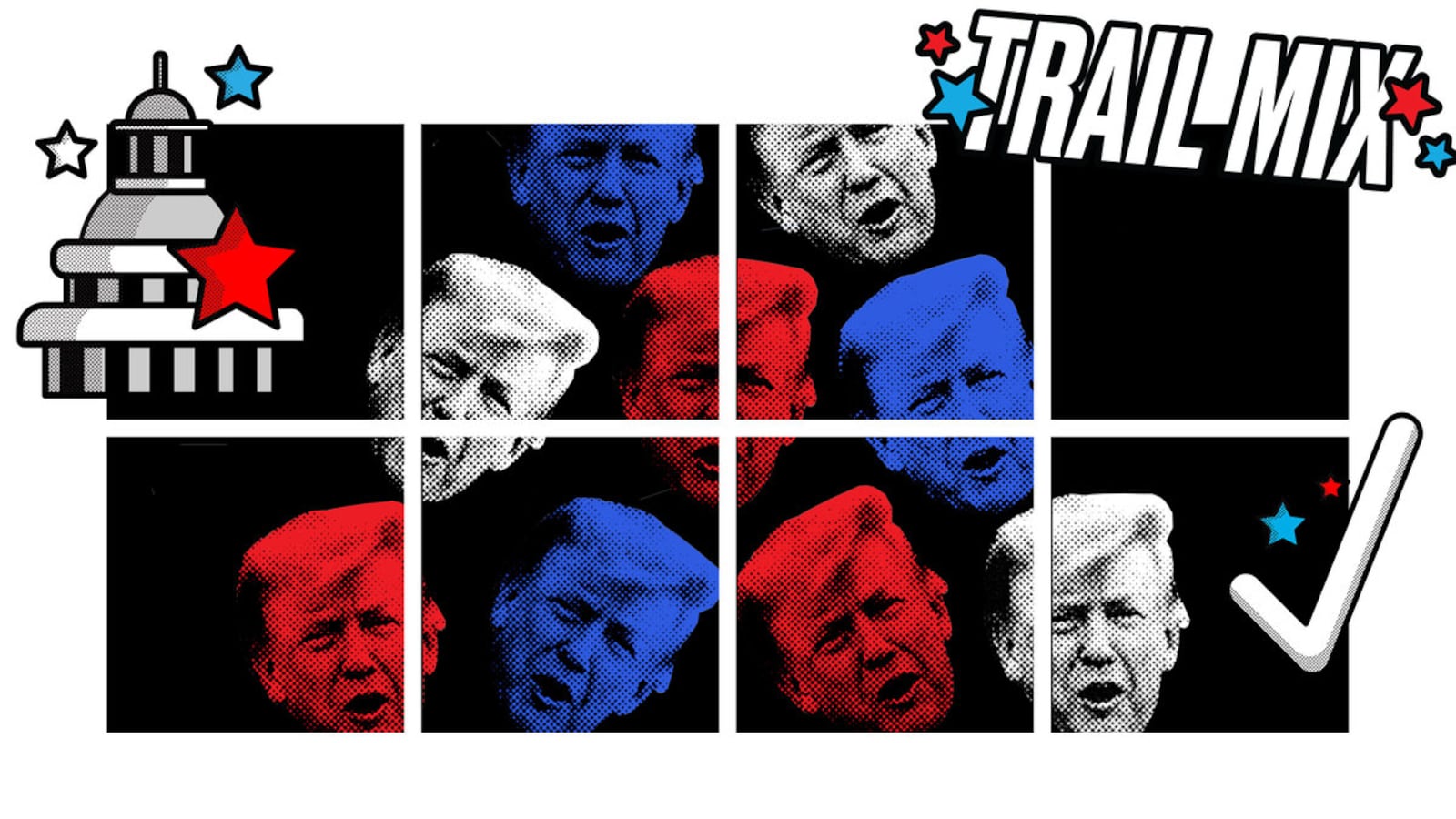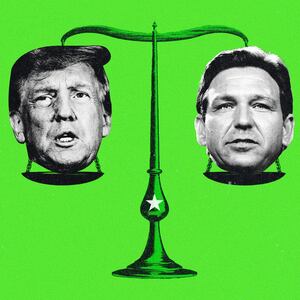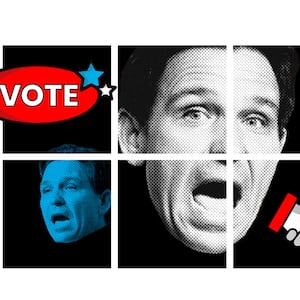Welcome to Trail Mix, a fun but nutritious snack for your election news diet. See something interesting on the trail? Email me at jake.lahut@thedailybeast.com.
This week, we reveal a bizarre developing strategy from the Trump campaign in New Hampshire—where, surprisingly, some Ron DeSantis momentum appears to be building.
Donald Trump might be well known for his shady business practices and aggressive corner-cutting measures—but a key aspect of his 2024 comeback strategy seems ripped straight from an episode of The Apprentice.
In the first-in-the-nation primary state of New Hampshire, the Trump campaign has decided to skip the conventional practice of paying for state-level field staff.
Instead, they’ve put their fate in the hands of what they hope will be an army of unpaid volunteers. In a Trumpian branding flourish, the campaign has devised what it is calling a “town captains” system, according to New Hampshire Republicans familiar with the plan.
In towns around the state, volunteers are expected to convince 10 other people to join the field organizing operation; those new recruits are then expected to each find 10 more people, and so on.
To some seasoned GOP operatives, the arrangement sounds more like the structure of a multi-level marketing company than a presidential campaign.
“It sounds like a Ponzi scheme,” one of Trump’s top advisers from his 2016 campaign told The Daily Beast. “My guess is they’re using these people for optics while they spend money on legal bills… What a fucking shitshow.”
As Trump deals with a new criminal indictment, his campaign is looking at a number of alternative strategies to save resources on his third consecutive presidential run. While Trump could certainly use reassurances in early states, he also seems to think he can save money by relying on his cult of personality—at least while he maintains commanding leads in the polls.
But there’s a reason presidential campaigns tend to rely on paid talent for the most important organizing gigs. In 2016, Trump ponied up for those positions. While he personally shirked from the nitty-gritty of retail politicking in New Hampshire, his paid field organizers built an effective voter outreach operation that carried the campaign to a resounding victory.
The decision this time around not to pay field organizers, according to two well-placed New Hampshire Republicans familiar with the decision, has not been received well in state GOP circles.
The volunteers will “have direction from the Trump team, but they’re expected to go find the people for the ground game,” a high-level New Hampshire Republican told The Daily Beast, noting that when they worked for the Trump campaign in 2016, there were paid field directors in place to recruit door knockers and ensure “everybody was making their metrics and making the appropriate contacts.”
The Trump campaign did not respond to a request for comment from The Daily Beast.
To some observers, a recent episode seemed to underscore the risks of relying so heavily on a volunteer workforce. A Trump town captain fainted in 94-degree heat while joining a group protesting a recent Ron DeSantis campaign stop and required an ambulance, according to a Republican who witnessed the episode.
Despite Trump’s nostalgia for his 2016 insurgency inspiring a scrappier campaign, their field organizing strategy is a drastic departure from that winning formula—raising questions about the ex-president’s broader readiness for a tough campaign.
“We had strike teams,” a top adviser from Trump’s 2016 campaign told The Daily Beast of that effort. “So we’d drop a month to two weeks before a primary and own the state: events blitz, media blitz, then the ground game with door knocking and temporary campaign offices.”
In addition to Trump’s adult children hitting the stump and holding smaller-scale events, the adviser acknowledged that the campaign of course had volunteers, “but for standard shit like phone banking.” Those volunteers also weren’t in charge of any higher-level strategic decisions.
Although the rough standard rate of $15.75 per hour for field staff is not costly in the aggregate, the penny pinching from the Trump campaign has stumped plugged-in GOP observers. The former president’s sustained small-dollar fundraising success—which left his campaign with $14 million on hand at the end of the last quarter—could easily fuel a professional field operation.
Certainly, that’s what Trump’s biggest rival is doing. Never Back Down, the well-funded super PAC supporting DeSantis, is handling voter outreach for him in New Hampshire. It’s largely the ex-president’s far less-resourced rivals who are relying on volunteers, like Nikki Haley.
Beyond being a strategic oversight or a way to save cash, the Trump campaign’s strange field strategy might reflect deeper-seated problems stemming from his hostile takeover of the GOP nearly eight years ago.
Trumpworld, of course, is known for a constant churn of staff. Some qualified, young GOP field operatives may be averse to stake their reputation on the former president, looking anxiously not just at his legal exposure but how he has treated former loyalists who are now working for DeSantis or do not support him.
“You have to look at how Trump ran—everything he does is the best, he hires the best and then he fires them all, so now they’re the worst. He did that with everybody,” the New Hampshire Republican said, pointing to his continued attacks on former White House Press Secretary Kayleigh McEnany as the latest example.
The result is a ragtag group of diehard MAGA supporters who don’t necessarily have the most polished persuasion skills at the doorstep—if they’re even interested in persuasion at all.
“Let’s be honest, other than the hardcore Trump people, the majority of people now wanna get paid,” said the same New Hampshire Republican, who backed Trump both in 2016 and in 2020. “Gas is expensive, summer is hot, we have black flies—door knocking requires a certain amount of endurance.”
“While we had followers, they were not the intensity that they are now,” they continued. “We had a lot of diversification. Now the Trump people are very hard Trump people with little tolerance for anybody else, so it’s gonna be a hard sell.”
To New Hampshire Republicans, what’s just as surprising as Trump’s baffling field strategy is DeSantis’ persistent outreach in the state.
As Trail Mix has previously detailed, the Florida governor is investing heavily in a strong performance in the Iowa caucuses; New Hampshire had been seen as tougher terrain.
But after some confusion over several members of the state legislature appearing to endorse both Trump and DeSantis, the governor’s operation has started to seriously impress longtime New Hampshire primary observers.
One of the senior New Hampshire Republicans who caught wind of the Trump campaign not paying for field organizers noted that the DeSantis team has quietly made inroads among state representatives and local lawmakers.
“The Trump people let their foot off the gas,” the Republican said, crediting the DeSantis team with returning to the state with a renewed effort after falling behind Trump in the early endorsement race.
New Hampshire is key to the ex-president’s hopes in 2024, and a loss there next winter could puncture his aura of inevitability in capturing the GOP nomination. Most of the early polling has shown him with safe, double-digit leads over DeSantis in the state, but some insiders doubt they reflect the real picture.
“The polls are wrong,” the Republican added. “DeSantis is a lot closer to Trump. I’d say it’s within 6 points, we’re not finding a lot of hardcore Trump people.”
Well played, Mike Pence. Well played.
Two new ads dropped this week highlighting where the 2024 primary is headed.
A pro-Mike Pence PAC dropped an ad heavily focused on Jan. 6, touting Pence as loyal to the Constitution and a bold fighter.
Then there’s Sen. Tim Scott’s latest spot, titled “Our Values,” where he throws some culture-war red meat into his otherwise optimistic messaging.
Both of these ads mark a new phase beginning in the campaign. While Chris Christie may have a lane to himself throwing haymakers at Trump all day, the Pence and Scott ads show the rest of the field is clearly comfortable taking calculated risks against the former president despite his continued dominance in the polls.
The news Thursday night, broken by Trump himself, that he'll be criminally indicted again on Tuesday has the potential to shake up the 2024 race. It also could be received much like Trump's first indictment two months ago: like a dud.
Not only did Trump's first indictment not shake up the presidential race, it actually seemed to solidify Trump's race—and was a boon to his fundraising. Whether this new case will have the same effect remains to be seen. But there is a real potential that the legal ramifications could catch up to Trump, either with jail time or just with a political cost, and that is one of the biggest question marks hanging over the 2024 race at the moment.
Stop Making Pence. Trail Mix’s own Jake Lahut unpacked what, exactly, Mike Pence is trying to do with his 2024 presidential bid, which he launched on Wednesday.
Not His Party. On that subject, Jonathan Swan of the New York Times had a sharp look at how Pence’s sterling Christian conservative credentials don’t really matter anymore.
Florida-California Line. Politico’s Jeremy White looked at the brewing feud between DeSantis and his California foil, Gov. Gavin Newsom.
Don’t Walk Away. The Daily Beast’s Roger Sollenberger has yet another Herschel Walker scoop, detailing how the former Senate hopeful is still under investigation by Georgia election officials.









